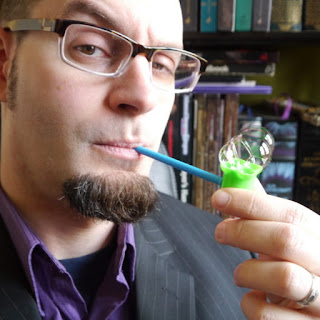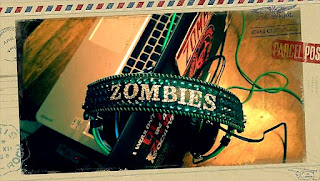Jim Avelli
The Voice of Indie
Please tell the readers a little bit about yourself
I’m a native New Yorker, but I don’t spend much time in NYC. I’m from the East end of Long Island originally, where I spent my teens and twenties drifting in and out of metal bands, writing and trying to be a comic artist. It got to the point where I needed to pick ONE trail that I was going to follow, and I picked writing.
What makes for a great dystopian novel?
For me, it’s believability. Anyone can write about an oppressive regime or some all-consuming evil empire but, unless it’s framed in a way that relates to real-world social or political structure, they can come off as flat, generic fantasy backdrops that exist only to make your characters look good.
Who are some of your favorite authors?
I very much enjoy Lovecraft, Hesse and Richard Adams for the way that they put words together, like painting narrative images. I like the puzzle-solving procedural elements of Thomas Harris and Arthur Conan Doyle because they’re down in the nuts and bolts, but they don’t get so deep into the details that I lose interest. (Some writers do)
What is your all-time favorite dystopian novel, and film?
A lot of people might disagree, but I consider Watership Down a great tale of dystopian society. The characters that want to live outside of the rigid old codes have to flee their home. They get attacked from all sides by organized efforts against them. Different levels of social classes are discouraged from fraternizing as well. They just happen to be rabbits.
I think Metropolis is still my favorite dystopian film. In the end, I don’t think Fritz Lang was happy with it, but I thought it got the point across.
If you could erase one dystopian cliche what would be your choice?
I’m not so hostile toward the cliché as some writers. Overused story mechanics are overused for a reason; people relate to them. It’s more the fault of Hollywood and the big publishing houses that things like the “chosen one” or the “corporate authoritarian” became so monotonous. These businesses need to turn a huge profit to keep functioning, so they aren’t willing to look at anything new. If it looks like something that already sells, they’ll sell it.
Which fictional character would be your perfect neighbor, and who would be your
nightmare neighbor?
Tolkien’s enigmatic Tom Bombadil would be ideal, I think. His constant singing might get annoying, but he’s prepared for every social situation and can throw a party together at a moment’s notice because of his ability to bend reality to his will. He’s almost psychotically generous as well.
Dolores Umbridge, from Harry Potter, would be my nightmare neighbor. She’s very observant, well-connected and wrathful to those that upset her apple cart.
What do you think of the current state of the genre?
I honestly don’t know if it’s on the upswing or not. Dystopian fiction is like horror in the sense that it’s always there somewhere. Certain films or books might thrust the genre into the spotlight for a minute, but then it fades back behind the summer action flicks and the winter dramas. It seems like that’s where it belongs, though. Tales of socio-economic ruin should always be waiting around the corner to scare the shit out of people.
What was the last great book you read, and what was the last book that disappointed you?
Prisoner of Azkaban, by J.K. Rowling was my last great read. Mostly, because I loved the way that she addressed time-travel. She established a firm set of rules for the device that let the characters bend time, and she made them stick to those rules. Not many writers are willing to do that. The last book that disappointed was Life, the Universe and Everything. By Douglas Adams. I enjoy weird British humor, but that one was just too weird for me.
How would you describe your writing style?
I’ve been asked this question before, and it’s hard to answer every time. A more experienced writer might be able to look at their own work objectively and point out its traits, but I’m not very good at this. I put a lot of attention into the way words roll into each other because I want them to feel natural to the reader. Sounds clashing mid-sentence can derail your train of thought and I, personally, have a hard time recovering from that when I'm reading.
Are there any reviews of your work, positive or negative that have stayed with you?
Not yet. The only work of mine that has been reviewed was the Baker Street Irregulars project that I did with Mike Ventrella. It was not favorable, but that’s what most of us expected from the fans of more traditional Sherlock Holmes tales. It was meant to be an odd-ball title.
What scares you?
Deep-sea creatures. The Vampire Squid, the Giant Angler, the Bobbit Worm? These things are terrifying and they’re real. Stay in your boat.
Who would be on the soundtrack to your life story?
The grunge bands of my high school days would make up the bulk of it, I think. I’d mix in some game soundtracks and some prog metal for the heavier scenes.
What’s the most important lesson you have learned about writing?
Keep moving. Accepting of that idea has made a world of difference for me. I used to finish a project and then bask in its glorious finished-ness for weeks. I’d send it off and then wait a month for a rejection letter before sending it out again. The one-at-a-time approach is frustrating and self-defeating. It’s much easier for me to work on the next “thing” while I wait. I recommend that everyone keep moving.
What aspects of writing to do you find the most difficult?
Finding that initial concept is the hardest part for me. It has to be something compelling and new, but not so new as to be unrelatable to a reader. It has to be big enough to support a cast of characters, but small enough to be portable to the desired setting. It should provoke thought from the reader, but not require hours of meditation to understand. Finding all this in one concept is difficult so, when you do, write it down so you don’t forget.
How do you think you’ve evolved creatively?
I’m much more willing to try something new than when I was younger. Back then, if it didn’t fit snugly into my preferred genre, I’d ignore it.
What tools do you feel are must-haves for writers?
A small, well-sourced reference library can be your best friend. I keep works on anatomy, cosmology, biology, historic weapons, metal craft and dog behavior, all within arm’s reach of my workspace.
What is the best piece of advice you ever received from another author?
“Write, finish, send, repeat.” Cory Doctorow.
Who is your favorite character from your story and why?
In the original draft of "Working Title", Li was going to have a best friend that helps him survive the first attack, and then dies a heroic death. That guy didn’t make it to the final edit, but he tried gallantly.
What character was the most difficult to develop?
Sebastian, the main plot driver. I wanted to make him more a part of the story as it unfolded, but there just wasn’t space to do it. I wanted to give him more of a reason to be off-site, maybe even infect him with the superbug so that he has to be constantly fed antibiotics and tended by nurses to keep off the effects of the illness that struck down two-thirds of the population. That would also explain why he runs his factory so rigidly, at such a high profit margin. I just didn't have time.
Fame, fortune, or respect?
Respect.
What piece of your own work are you most proud of?
“A Spider’s Vow” is the first book in a Sci-Fi trilogy that I’m currently working on. It almost came together of its own will. So far, that was my favorite project.
What 3 words would you use to describe your writing style?
Polish …that …turd.
For those who haven’t read any of your books, what book of yours do you think best represents your work and why?
“Spider’s Vow” again. It’s representative because it has all the elements that I like to be included in a story. Some intrigue, some narrow escapes, some character death but not too much of any one part.
Can you tell us about your last book, and can you tell us about what you are working on next?
The last book I finished was something I pitched to the legendary Ed Greenwood. “One Left Behind” is a story about memories being forcibly rewritten and the psychological trauma that can arise from that. Greenwood wanted it, but his publishing house had to cut back on its acquisitions. I put OLB out on my own after another round of edits.
At the moment, I’m working on the follow up to “Spider’s Vow”. Book two is shaping up nicely.
What's the one question you wish you would get asked but never do?
I wish more people would ask me about music. I’m more comfortable talking about that than publishing.
https://www.facebook.com/jim.
https://www.smashwords.com/
Bio: Hailing from the back-woods of Shirley, New York, weighing in at 183 pounds and about 25 words-per-minute, the Coffee Spiller, the Grammar Mangler, the 4 AM Dairy Truck Crusher, Jim Avelli!! (crowd noise!)




Comments
Post a Comment